(German language only)
Infographic of the bodies & committees
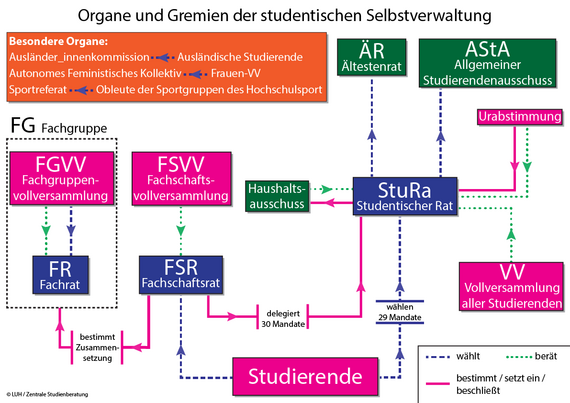
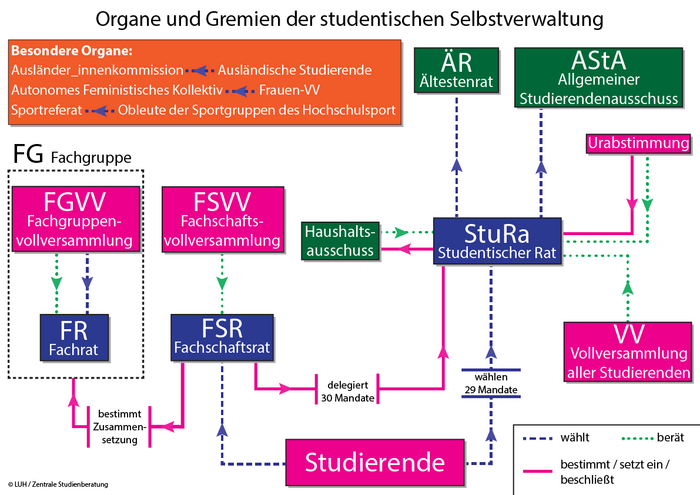
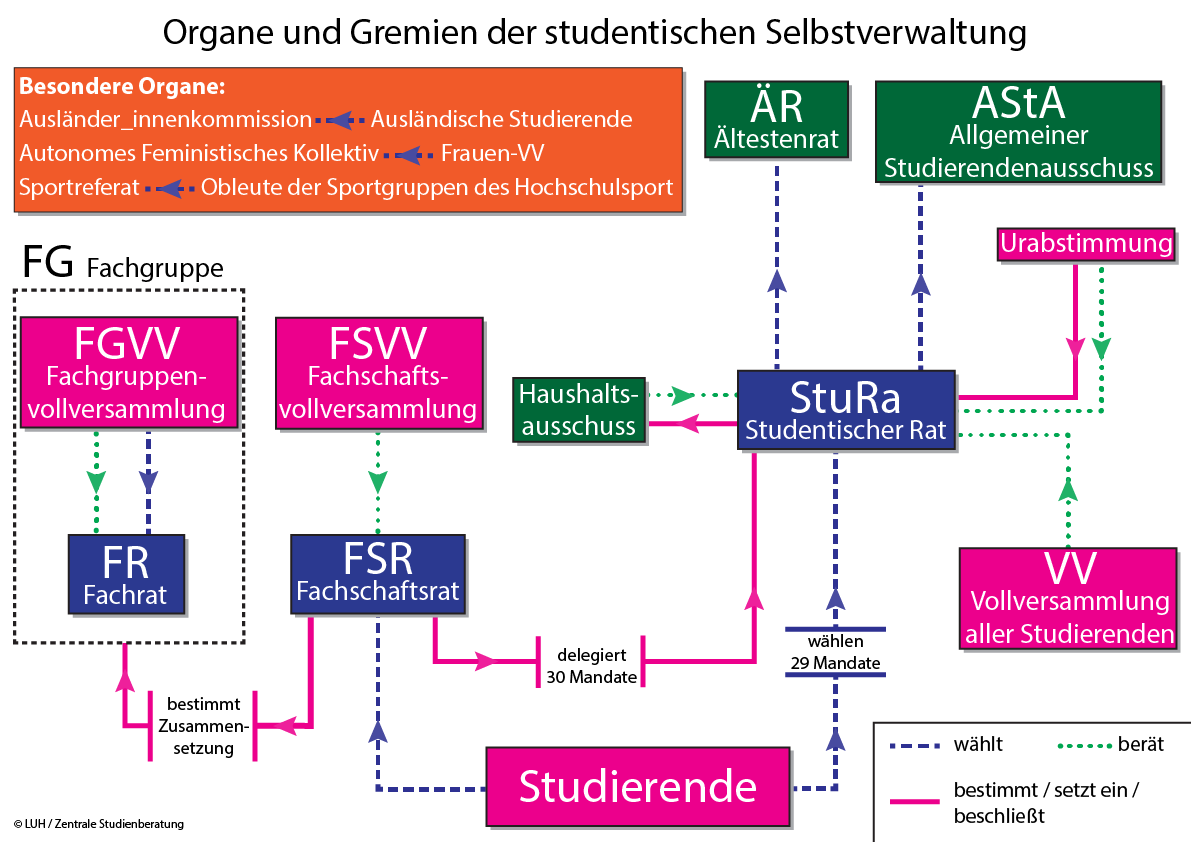 ©
Zentrale Studienberatung / LUH
©
Zentrale Studienberatung / LUH
In this infographic you can find all bodies and committees of student self-administration and their interactions. You can find more detailed information on the bodies in the sections below.
Students' union (AStA)

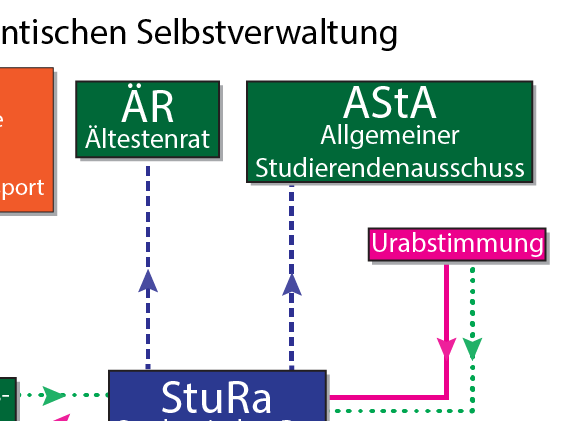
 ©
Zentrale Studienberatung / LUH
©
Zentrale Studienberatung / LUH
AStA (Allgemeiner Studierendenausschuss) is the body representing all students at Leibniz Universität Hannover. According to §20 NHG it is the duty of the student body to represent the students at the university and in society in matters concerning university politics, social and cultural affairs. It is responsible for promoting the political education of students and the implementation of the university’s objectives. In this sense it represents its members politically. The student councils of the individual faculties (Fachschaften) form the basis of this organisation.
AStA consists of several officers, so that the different topic areas can be dealt with optimally and intensively. A major part of the work does not, however, consist of work specific to the different topic areas but of general issues such as maintaining contact to the student faculty councils and the structures outside the remit of the organised student body of this university.
Student Council (StuRa)


 ©
Zentrale Studienberatung / LUH
©
Zentrale Studienberatung / LUH
The task of the Student Council (Studentischer Rat, StuRa) is to make decisions on matters concerning the student body as a whole. It is comprised of nominated delegates from the individual Faculty Student Councils and of members elected directly by all the students.
The term of office of the members of the Student Council is two semesters and generally begins in the Summer Semester following the election.
The student parliament votes for an executive board which consists of three executives from the parliament body.
Elections to the decision-making bodies of the constituted student body are held in accordance with the regulations set out in the Lower Saxony Higher Education Act (NHG) as well as the charter of Leibniz University Hannover Student Body and the election regulations for the student body of Leibniz University Hannover.
Council of Elders (ÄR)


 ©
Zentrale Studienberatung / LUH
©
Zentrale Studienberatung / LUH
The Council of Elders (Ältestenrat, ÄR) is an organ of the student body. It consists of five student members, who are elected for a one-year term of office by the Student Council.
The Council of Elders is responsible for monitoring the activities of the organs of the student body and for interpreting its rules and regulations. In addition, it can act as an arbitration tribunal in private legal disputes between students.
General Assembly of Students (VV)
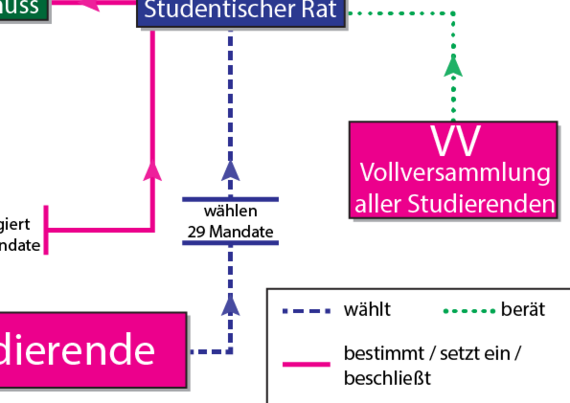
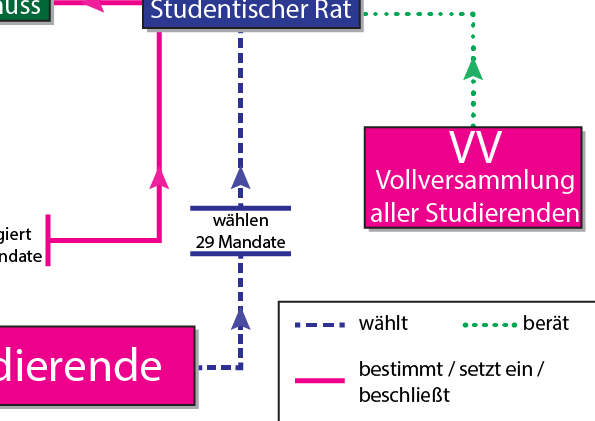
 ©
Zentrale Studienberatung / LUH
©
Zentrale Studienberatung / LUH
A university-wide general assembly of students (Studentische Vollversammlung, VV) convenes when especially important and acute issues such as protest actions or similar are to be discussed. All students of the university are entitled to participate. The general assembly confirms the suggestion of the Senate on the appointment or dismissal of members of the presidential committee, and comments on the development and economic plans of Leibniz Universität.
Likewise, the general student representative body (AStA) can also conduct a general ballot, for example the annual decision on the semester ticket.
Student Representation within the Faculties (FSR & FR)


 ©
Zentrale Studienberatung / LUH
©
Zentrale Studienberatung / LUH
All the students of one faculty combined form the student body of a faculty (ger.: Fachschaft) of this faculty. Students automatically become members of this body by their enrolment in a degree programme of that faculty. It is possible for students to be in multiple student bodies, if they study programmes involving multiple faculties. This is very often the case for students in the interdisciplinary bachelor’s degree programme (FüBA) e.g. when they study Biology and German. With this subject combination, a student would be a member of the faculty student body of natural sciences and the body of humanities.
The student body of a faculty elects the faculty student body council (ger.: Fachschaftsrat (FSR)) for a term of two semesters. The FSR has one Member per started 100 students in the student body with a minimum of five members. An FSR represents the interests of the faculty student body university-wide.
The FSR is advised by the faculty student body general assembly (ger.: Fachschaftsvollversammlung (FSVV)). An FSVV is the assembly of all members of a given faculty student body. Decisions made by the FSVV are recommendations, which have to be discussed by the FSR.
Subject sections (ger.: Fachgruppen (FG)) are usually subdivisions of one faculty student body. An FG can also consist of parts of different student bodies. In most cases, subject sections include the students of all degree programmes regarding one subject of study, e.g. all students of political sciences in the FüBA, the 1-subject-bachelor’s and the master’s programme. This division of the faculty student body is not mandatory. The Faculty of Mathematics and Physics for example has no subject sections, and with thus “only” an FSR and no subordinate student councils.
The students of an FG constitute the subject section general assembly (ger.: Fachgruppenvollversammlung (FGVV)), which advises their student council (ger.: Fachrat (FR)). Student councils are elected for one year, usually during an FGVV. An FR represents the interests of the students in its subject section university-wide. They often organize orientation events for new students, field trips or student-lead seminars. Furthermore, there are multiple student cafés and newspapers run by student councils. These councils are often the connection between students and the department administration.
Colloquially student councils, in German “Fachrat”, are often wrongly called “Fachschaft” or “Fachschaftsrat”. Additionally, not all student councils are called “Fachrat”. For example the student council of the subject section History is called “Studierendenrat Geschichte”, for historic reasons only.
Student councils are the part of student self-administration that students will interact with the most, and in which they can participate the easiest.
International students committee


 ©
Zentrale Studienberatung / LUH
©
Zentrale Studienberatung / LUH
The international students committee (Ger.: AusländerInnenkommission) is a ‚special committee of the student body’ („Besonderes Organ der Studierendenschaft“) according to §5 of the bylaes of the student body. It represents the interests of international students at the LUH and in the preparatory foundation course (Studienkolleg). The committee consists of three parts:
The general assembly of international students (Ger.: AusländerInnenvollversammlung (AVV)) consists of all international students (without German citizenship) at the LUH and in the preparatory foundation course. It is the highest decision-making body of the international student committee. The most important duties of the AVV are the election of the standing committee of international students, principle decisions in university policy regarding international students, formulating a budget plan, and controlling the work of the other parts of the international student committee.
The standing committee of international students (Ger.: Ständiger AusländerInnenausschuss (SAA)) has 5 members (called 'Referenten' in German), that are elected by the AVV for one year. The standing committee controls the work of the international student spokespersons and the adherence to the budget plan. The SAA also supports the spokespersons and approves special financial expenses.
During the university elections the two international students spokespersons (Ger.: AusländerInnensprecherInnen (AS)) are directly elected for one year by the international students. The spokespersons implement the decisions of the AVV and SAA, and represent the interests of international students in daily university politics at LUH.
Autonomous feminist collectiv (AFK)


 ©
Zentrale Studienberatung / LUH
©
Zentrale Studienberatung / LUH
The autonomous feminist collectiv (Ger.: Autonome Feministische Kollektiv (AFK)) is a ‚special committee of the student body’ („Besonderes Organ der Studierendenschaft“) according to §5 of the bylaws of the student body. Sometimes it is also called “Women’s collective”. It represents the interests of all students, which identify as women, which includes FLTI*persons (WomenLesbiansTransInter). The AFK supports gender equality and cultural and social issues regarding women. The AFK consists of at least four members, which are elected for one year by the general assembly of women (Ger.: Frauenvollversammlung (FVV)).
All female students of the LUH are automatically voting members of the FVV. The general assembly determines the general guidelines of the AFK, controls the work of the collective, formulates the AFKs budget plan and gives statements on matters regarding women.
Representation of university sports


 ©
Zentrale Studienberatung / LUH
©
Zentrale Studienberatung / LUH
The representation of university sports (Ger.: Sportreferat) is a ‚special committee of the student body’ („Besonderes Organ der Studierendenschaft“) according to §5 of the bylaws of the student body. It is the representation of all members of university sports, including students and employees. The representation is a cooperation of the representatives of all universities involved in university sports. Its members are called sports representatives (Ger.: SportreferentInnen). The representatives are elected by the assembly of chairpersons (Ger.: Obleuteversammlung (OV)).
Chairpersons (Ger.: Obleute) are elected for one semester, as representatives of one sport group of the university sports. All chairpersons are automatically members of the OV. Additional members of the OV are members of the sports representatives, the training supervisors of the sport groups and the members of the University Sports Centre advisory board (Ger.: ZfH-Beirat). All members of the OV have the right to speak and make proposals, but only the chairpersons have the right to vote. Non-student chairpersons lose their right to vote in matters regarding student self-administration (e.g. the election of the sports representatives).
The OV has multiple tasks. It gives assignments to the sports representatives and controls and supports them. It decides on a budget plan and gives statements or recommendation on university-political matters. Its most important task is the election of the sport representatives.
The sport representatives are elected for one year and must be enrolled students at a university involved in university sports. According to the statute of the members of university sports, the representation of university sports usually consists of three representatives of the LUH and one representative per other university.
The sports representatives have among others, the following tasks: formulating a budget plan, representing the members of university sports in the University Sports Centre advisory board, planning and running of the university sports festival and providing financial support for students to participate in competitions of for training supervisors to attend additional training courses.











